Costa Rica’s President Rodrigo Chaves expressed relief and defiance yesterday after congress failed to strip him of his legal immunity. The vote, which took place late Monday in San José, marked a first in the nation’s history—no sitting president had faced such a challenge before. Lawmakers rejected the motion with 34 votes in favor and 21 against, falling short of the 38 needed for approval.
Chaves, speaking at the opening of a new health center in Carrillo, Guanacaste, described the outcome as a personal and national triumph. “I woke up happy and hopeful,” he told the crowd. “Yesterday, Costa Rica, our democracy, and our people won.” He framed the effort against him as an attack on the will of the majority, saying it aimed to intimidate the presidency and those who support him.
The 64-year-old leader didn’t hold back in his remarks. He praised the 21 lawmakers and seven Supreme Court magistrates who opposed the move as patriots who defended the separation of powers. In sharp contrast, he branded the 34 legislators and 15 magistrates who backed the removal as cowards and coup plotters.
Chaves pointed fingers at Attorney General Carlo Díaz and Assembly President Rodrigo Arias, accusing them of leading a network that has held sway for decades. “Those 21 deputies stopped a violation of the protections for all branches of government,” he said. “They put our laws above political threats.”
Prosecutors had accused Chaves of concusión, a form of abuse of power that carries up to eight years in prison. They claimed he pressured a communications company, hired with funds from the Central American Bank for Economic Integration, to hand over $32,000 to his friend and former image advisor, Federico Cruz. The case bypassed standard procedures, investigators said, raising questions about misuse of public money.
Chaves dismissed the charges as a fabricated spectacle meant to undermine him. “This was a political show, a stunt of great baseness,” he declared. He argued that anyone examining the facts without bias would see it as disguised persecution. While he celebrated the vote as a key battle won, he warned that the fight continues. “The war is not over; they will keep attacking me,” he added.
The process began on July 1 when the Supreme Court, in a 15-7 split, forwarded the request to congress. A special legislative committee reviewed the evidence and recommended proceeding, but the full assembly’s vote sealed Chaves’ protection for now. He remains shielded from trial until his term ends in May 2026, when ordinary courts could take up the matter.
This episode has stirred debate here as our country has been historically known for its stable institutions amid regional turmoil. Chaves, a former World Bank economist, came to power in 2022 with promises to shake up the system. He often targets the judiciary, legislature, prosecutors, and press in his public statements, positioning himself as an outsider against entrenched interests.
Supporters see the failed vote as validation of his leadership ahead of next February’s elections, where his party aims to hold ground despite his inability to run again. Opponents argue it highlights accountability gaps, even if the attempt set a precedent.
For now, our President presses on with his agenda, including public works like the Guanacaste health facility. The outcome lets him focus on governing without immediate legal threats, though the accusations linger as a shadow over his administration.






